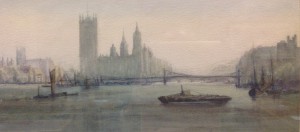
My eye was caught recently by a super watercolour of the Houses of Parliament in the mist, viewed from the Thames, in the days before motorised boats on the river. As it was hanging on the wall of the room where the Liberal Democrat European Group held its AGM, I was tempted to quip that that might be the age to which Eurosceptics seek to turn back the clock. This was the age of empire and Rule Britannia. I can see the appeal of that romanticised vision but golden ages don’t usually stand close scrutiny, and this vision is particularly deceptive.
The European Union is a newish body, but it builds on a rich heritage. The Britain that “ruled the waves” was one of the European powers with a colonial story. We have been rivals, but we and our European neighbours were neighbours across the world.
Scratching the surface barely more deeply, there are the seemingly-unending stories of migration, preserved in some of our surnames, and in the genetic mapping of the UK which shows England’s genetic debt to the Saxons who settled here.
At the end of the Civil War(s), we had the trauma of executing our king. His heir went into exile in France. I read the story of the decades after the Restoration as an attempt at monarchy, but deeply scarred by what had happened. In the end the process ran aground: James II showed himself an unsuitable monarch, and parliament encouraged the Dutch William of Orange and his wife Mary Stuart to invade and ascend the throne, becoming the joint monarchs William and Mary. Things still didn’t settle, and eventually the problem was solved by importing the Elector of Hanover to become George I. The King of England remained an elector of the Holy Roman Empire until it dissolved in 1806. We were intimately grafted into the European story.
I could argue that that Holy Roman Empire was an important precursor of the European Union. It brought together a raft of small states, which enjoyed peace and prosperity which came from standing together, but also the freedom of independence within a broader structure — in modern terms, they enjoyed subsidiarity.
I could push the parallel further back, to think of the rich trading network of the Hanseatic League, stretching around the Baltic, Scandinavia and along the northern coast of Europe. This was more than a free-trade area: there were occasional meetings of its “parliament”, the Hansetag, and complex arrangements for cities in the league to surrender some of their autonomy to participate in something bigger and more stable.
In the time of that painting, the nations of Europe were deeply intertwined: there was much that no one nation could resist alone.
The European Union is “new” in that the institutions are new, but the idea of European nations clubbing together and pooling some sovereignty in the interests of peace and stability has been with us for a long time. It’s as much part of us as the shared legacy of colonialism.
The “golden age” barely existed. One of the hints at its absence is that, if the EU were to become a monarchy, the Queen of England would have a strong claim to the throne, not on her merits, but because inter-marriage between the royal houses of Europe means she is close to most of the royal lines.
Today the growth of China, India, Brazil, Indonesia (etc.) is re-drawing the map. The Eurosceptic desire to turn the clock back to a “golden age that never was” is a flight from reality. It is dangerous because it is with our European partners that we have the best prospects of peace and stability: this is time to draw on the part of our heritage which enables us to work closely with our neighbours.
And the dreaded “rules from Brussels” — apart from being far fewer than claimed — are not the long hand of repression. Thy look rather different when they, like the rules in the Hanseatic league, are what enable people to trade fairly and freely. They have to come from Brussels because the same rules are needed everywhere for genuine free trade.
In supporting membership of the EU, we are being true to our roots, and building for the future.